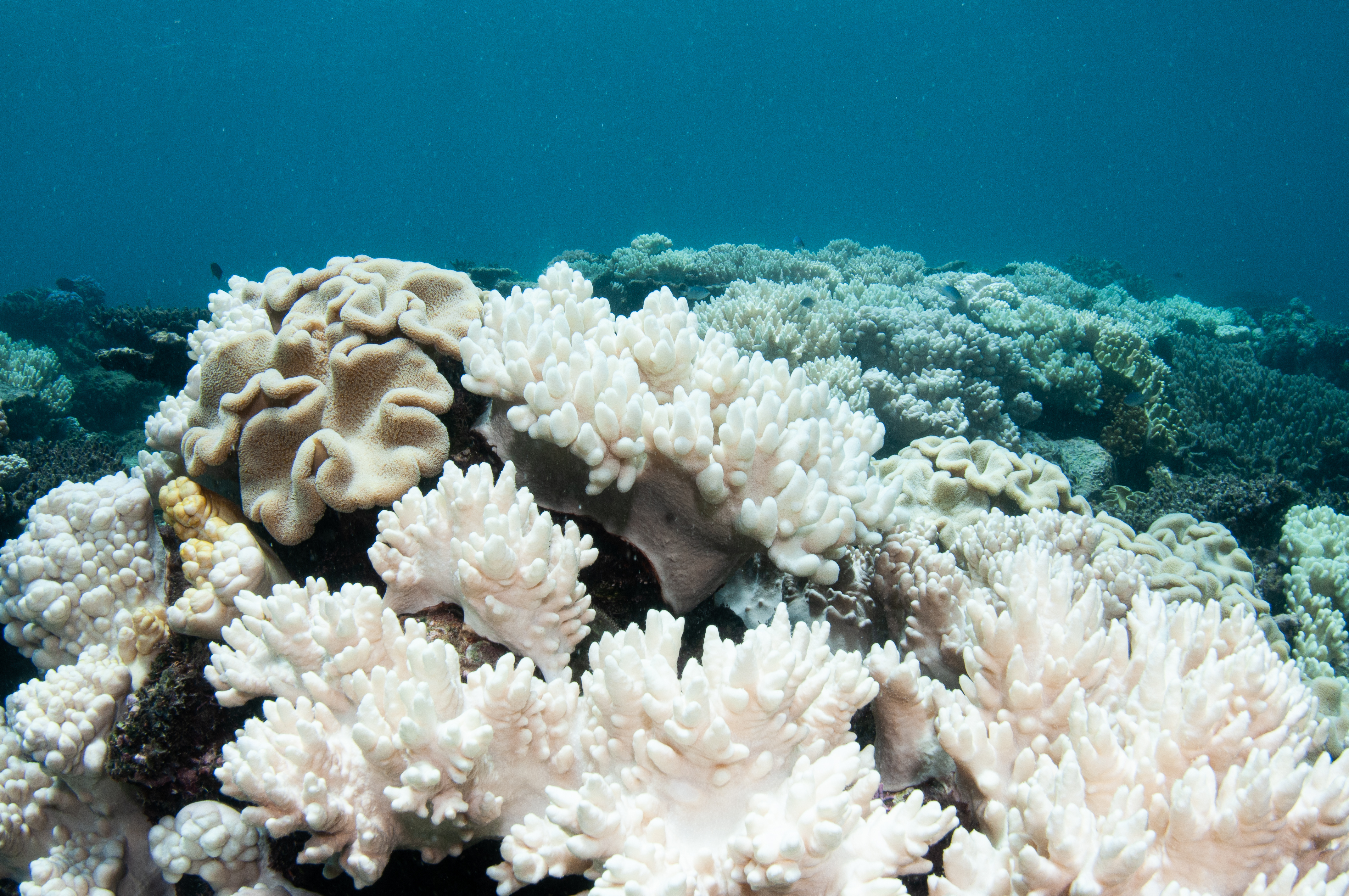The state of the largest coral reefs in the world
Coral reefs are experiencing ocean acidification and coral bleaching, including Australia's Great Barrier Reef


A free daily email with the biggest news stories of the day – and the best features from TheWeek.com
You are now subscribed
Your newsletter sign-up was successful
Coral reefs are called the rainforests of the ocean for their robust biodiversity. However, climate change, tourism and other human actions are threatening the delicate ecosystems, and the consequences could be catastrophic. Here's the current state of some of the most famous coral reefs in the world.
1. Great Barrier Reef
The Great Barrier Reef off the coast of Australia is the largest coral reef in the world. It spans 1,400 miles and is home to 400 types of coral, 1,500 species of fish and 4,000 types of mollusk, according to the United Nations Educational, Scientific and Cultural Organization (Unesco).
The reef has been considered for addition to Unesco's World Heritage in Danger list. However, it narrowly avoided it, CNN reported. The site was left off as the United Nations deemed that Australia has made "significant progress" in its reef conservation. The country created legislation to cut emissions by 43% by 2030 and reach net zero by 2050, canceled plans for two dams that would be built in the region and rejected a coal mine application, Euronews reported.
The Week
Escape your echo chamber. Get the facts behind the news, plus analysis from multiple perspectives.

Sign up for The Week's Free Newsletters
From our morning news briefing to a weekly Good News Newsletter, get the best of The Week delivered directly to your inbox.
From our morning news briefing to a weekly Good News Newsletter, get the best of The Week delivered directly to your inbox.
However, "a lot of climate scientists are shocked by the fact that it wasn't put on the list," Kimberley Reid from the ARC Centre of Excellence for Climate Extremes and Monash University, told CNN. Climate change and overfishing still leave the reef under "serious threat," according to the U.N. Global temperatures are rapidly warming, which can prove disastrous. "It reminds us that sticking to that path we are currently on, simply because we started on it, will not offer the best solution for the Great Barrier Reef," Chennupati Jagadish, a professor and the president of the Australian Academy of Sciences, told Euronews.
2. Coral Triangle
The Coral Triangle refers to a series of coral reefs spanning across 5.7 million miles in Southeast Asia. It's the "most diverse and biologically complex marine ecosystem on the planet" and "matches the richness and diversity of the Amazon rainforest," according to the National Oceanic and Atmospheric Administration (NOAA).
Southeast Asia is one of the most susceptible regions to climate change, and the same goes for the surrounding corals. Ocean acidification is the "reduction in the pH of the ocean over an extended period of time, caused primarily by uptake of carbon dioxide (CO2)," and it's a large threat to coral reefs especially in the Coral Triangle, per NOAA. The phenomenon "can create an 'osteoporosis effect' that eats away the minerals used by coral reefs" and other marine life," reported The Guardian.
The region is also feeling the repercussions of other human activities including cyanide fishing, which is when fishermen use the poison to "quickly and cheaply stun ornamental fish" to sell them, as well as pollution from agricultural runoff, according to the Smithsonian Magazine. Researchers in the region are actively working to combat these challenges and promote conservation, and public interest in conservation is growing as well.
A free daily email with the biggest news stories of the day – and the best features from TheWeek.com
Without any action, "in the next century, maybe all coral reef researchers will be paleontologists," a coral researcher said to the Smithsonian Natural History Museum.
3. Florida's coral reef
Florida has an extensive coral reef that spans approximately 360 miles and is "designated by the Florida Legislature as the Kristin Jacobs Coral Reef Ecosystem Conservation Area," according to the Florida Department of Environmental Protection. This reef faces intense threats due to climate change.
The ocean surrounding Florida is currently at record-high temperatures over 90 degrees Fahrenheit. The heat has caused widespread coral bleaching deemed the "most severe in the state's history," Derek Manzello, the coordinator of NOAA's Coral Reef Watch program, told The New York Times. "I fear for the worst." Seven coral species present in the Florida reef are listed as threatened under the Endangered Species Act.
Some regions of the reef were already dead before researchers could arrive so divers immediately prioritized "salvaging samples of the most threatened species of coral," as a "last-ditch sort of insurance policy," Jennifer Moore, who's leading the effort and coordinates coral recovery for NOAA Fisheries' Southeast region, told the Times. While this effort can buy time for the reef, the problem can only be helped by reducing greenhouse gas emissions and combating climate change.
"You talk about canaries in the coal mine," Manzello said. "These canaries have been dying now for 40 years."
4. The Hawaiian reefs
Hawaii's coral reefs make up 85% of American coral reefs, according to the Coral Reef Alliance. The reefs are particularly important to Hawaiians, as they "provide habitat for … nearshore fisheries, protect coasts from waves and storms and support tourism and fishing industries worth billions of dollars," according to the Hawaii Division of Natural Resources.
Like the other reefs, the Hawaiian reefs are also experiencing mass bleaching events and ocean acidification. The reefs went from "very good" condition to "fair" condition in 2018, per a NOAA assessment. Along with the environmental conditions, Hawaii is a popular tourist destination, and "tourists are loving Hawaii's coral reefs to death," Forbes stated. A study published in the journal Nature Sustainability found that "higher live coral cover attracts reef visitors but that visitation contributes to subsequent reef degradation." This is largely due to people's direct contact with the reefs causing damage, as well as the increased development and pollution associated with tourists and tourism.
In order to combat damage, the environmental group the Nature Conservancy is attempting a new method of protecting the ecosystem: taking out an insurance policy on the reef. Essentially, the organization "will use the insurance money to pay teams of divers to start repairing the damage," The New York Times reported. "We think we can help our Hawaii state government put this into place as a pilot project," Makale'a Ane, who leads community engagement and partnerships in Hawaii for the Nature Conservancy, told the Times. "It's not simple."
5. Red Sea Coral Reef
The Red Sea Coral Reef located between Asia and Africa is considered an "anomaly," potentially able to withstand heat, per The New York Times. The reef is home to 200 species of coral, and the Red Sea sees warmer temperatures than many other bodies of water globally. "If not the last, this could be one of the last coral refuges worldwide," Dr. Mahmoud Hanafy, a marine biology professor at the Suez Canal University, told the Times.
This reef could be studied to investigate how to help other reefs because it's "still in good shape compared to other reefs that have been devastated by recent ocean heat waves," per Inside Climate News. However, this does not mean it will stay this way. While the Red Sea reef is more suited to heat than other reefs, constantly rising temperatures along with excessive tourism will still likely put pressure on it. "We forgot about the carrying capacity of the ecosystem. So we ended with very intensive development in some areas of the Red Sea," Hanafy told Inside Climate News.
A brewing threat for the reef is the sudden die-off of the black sea urchin in the region. The marine animal is "critical to maintaining a healthy reef habitat," reported The Associated Press. Researchers suspect a "rapidly spreading epidemic" but have yet to identify it specifically. It was first found in the Mediterranean Sea but is spreading. "We need to understand, and decision-makers need to understand, that the window of opportunity to take action is very, very narrow. And it's closing rapidly," researcher Dr. Omri Bronstein told CNN.
Devika Rao has worked as a staff writer at The Week since 2022, covering science, the environment, climate and business. She previously worked as a policy associate for a nonprofit organization advocating for environmental action from a business perspective.
-
 How the FCC’s ‘equal time’ rule works
How the FCC’s ‘equal time’ rule worksIn the Spotlight The law is at the heart of the Colbert-CBS conflict
-
 What is the endgame in the DHS shutdown?
What is the endgame in the DHS shutdown?Today’s Big Question Democrats want to rein in ICE’s immigration crackdown
-
 ‘Poor time management isn’t just an inconvenience’
‘Poor time management isn’t just an inconvenience’Instant Opinion Opinion, comment and editorials of the day
-
 How climate change is affecting Christmas
How climate change is affecting ChristmasThe Explainer There may be a slim chance of future white Christmases
-
 5 recent breakthroughs in biology
5 recent breakthroughs in biologyIn depth From ancient bacteria, to modern cures, to future research
-
 Why scientists are attempting nuclear fusion
Why scientists are attempting nuclear fusionThe Explainer Harnessing the reaction that powers the stars could offer a potentially unlimited source of carbon-free energy, and the race is hotting up
-
 Canyons under the Antarctic have deep impacts
Canyons under the Antarctic have deep impactsUnder the radar Submarine canyons could be affecting the climate more than previously thought
-
 NASA is moving away from tracking climate change
NASA is moving away from tracking climate changeThe Explainer Climate missions could be going dark
-
 What would happen to Earth if humans went extinct?
What would happen to Earth if humans went extinct?The Explainer Human extinction could potentially give rise to new species and climates
-
 Bacteria can turn plastic waste into a painkiller
Bacteria can turn plastic waste into a painkillerUnder the radar The process could be a solution to plastic pollution
-
 Full moon calendar 2025: when is the next full moon?
Full moon calendar 2025: when is the next full moon?In depth When to see the lunar phenomenon every month
